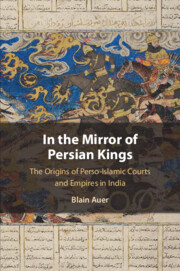Book contents
- In the Mirror of Persian Kings
- In the Mirror of Persian Kings
- Copyright page
- Dedication
- Contents
- Figures and Maps
- Maps
- Preface: In the Mirror of Persian Kings in India
- Abbreviations
- A Note on Transliteration
- 1 The History of Persian Kingship and Persianization in South Asia
- 2 Kings in History
- 3 Warrior King
- 4 Theory and Application of Persianate Political Ethics in India
- 5 The Pen, the Sword, and the Vizier
- Conclusion
- Bibliography
- Index
Conclusion
Published online by Cambridge University Press: 17 April 2021
- In the Mirror of Persian Kings
- In the Mirror of Persian Kings
- Copyright page
- Dedication
- Contents
- Figures and Maps
- Maps
- Preface: In the Mirror of Persian Kings in India
- Abbreviations
- A Note on Transliteration
- 1 The History of Persian Kingship and Persianization in South Asia
- 2 Kings in History
- 3 Warrior King
- 4 Theory and Application of Persianate Political Ethics in India
- 5 The Pen, the Sword, and the Vizier
- Conclusion
- Bibliography
- Index
Summary
In September of 1857, Bahādur Shāh II (r. 1253–1274/1837–1857), the last Mughal king of Delhi, had taken asylum in the tomb of his ancestor Humāyūn outside the walls of his beloved city. The “mutiny” of Indian soldiers serving under the British crown was in its fourth month. As fighting was reaching its peak, British soldiers were preparing their siege of the symbolic heart of Islamic political and cultural hegemony in India. The king had resigned himself to defeat and on the 21st of September, William Hodgson, a cavalry commander, surrounded the tomb and negotiated Bahādur Shāh’s surrender. The rebellion would continue for another year, but the hope of restoring the Mughal dynasty had been crushed forever. Just one year earlier, in 1856, Awadh had been annexed by the British, removing Wājid ʿAlī Shāh as nawab. The vestiges of the old regime still exercised influence and those nobles that remained held on tenaciously to the remnants of their authority. Sharaf al-Dawla, who had been vizier to Wājid ʿAlī Shāh now declared his fidelity to the king in Delhi on the 13th of September, sending him valuable gifts of horses, elephants, jewels, and gold along with his offer of the allegiance of Awadh. This was not to be and Mīrzā Asad Allāh Khān Ghālib (1797–1869), the last Mughal poet laureate and tutor to the king, lamented the tragedy of Sharaf al-Dawla’s fleeting political gesture noting, “All of this grandeur was like a flickering lamp, as if the evil eye was watching the short-lived splendour; for, after the arrival of these rare gifts from the kingdom of Awadh, this fable of pomp and splendour, which equalled that of Alexander and the fabulous mirror, and Jamshīd and the wonderful cup, came to an end.”
- Type
- Chapter
- Information
- In the Mirror of Persian KingsThe Origins of Perso-Islamic Courts and Empires in India, pp. 188 - 194Publisher: Cambridge University PressPrint publication year: 2021

